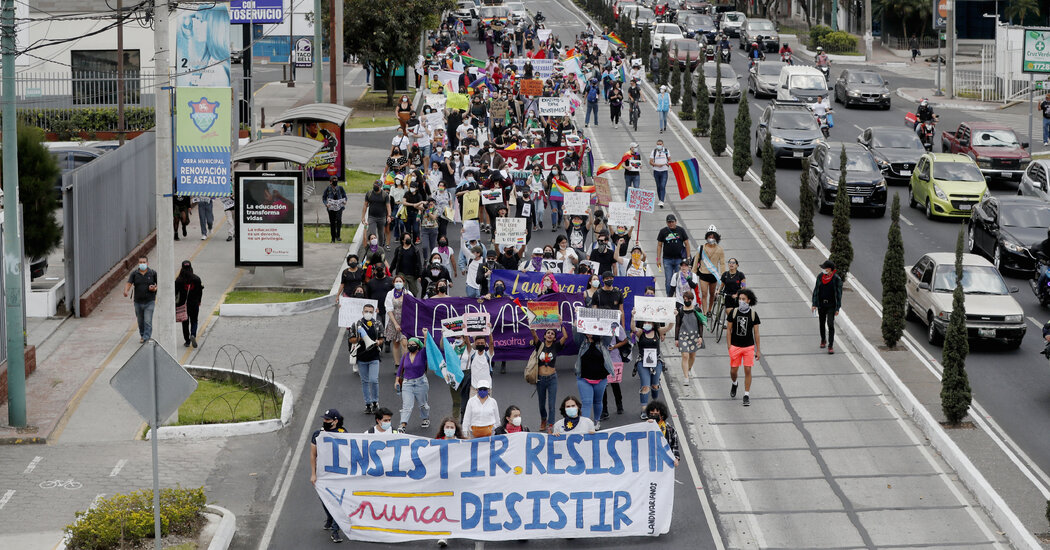President Alejandro Giammattei said he would veto the bill days after his allies pushed it through the legislature, a move that surprised analysts, human rights activists and officials.
GUATEMALA CITY — Guatemala’s congress on Tuesday shelved a bill that would have imposed up to 10 years of jail time for women who obtained abortions, an abrupt reversal that follows days of protests, legal challenges and widespread disapproval of the measure, including from a prominent anti-abortion group.
The U.S. government also expressed serious concerns about enacting the legislation, which also banned same-sex marriage, in back-channel conversations with the Guatemalan government, according to two American officials who spoke on condition of anonymity to discuss sensitive policy matters.
The country’s president, Alejandro Giammattei, said he would veto the bill days after his allies pushed it through the legislature, a move that surprised analysts, human rights activists and Guatemalan officials.
On March 9, the day after the bill passed, Mr. Giammattei attended a ceremony declaring Guatemala the “pro-life capital” of Latin America, where he said in a speech that he believed “in respect for life from the moment of conception.”
But by Thursday, the president was distancing himself from the bill. In a short video address, Mr. Giammattei said the anti-abortion ceremony should not be linked to the legislature’s approval of the anti-abortion measure, which he said “suffers from technical deficiencies” and “violates the constitution of the republic.”
Officials and human rights activists say the reversal was probably prompted by the immediate backlash to the approval of the bill at home and abroad, which made signing it politically risky for Guatemala’s profoundly unpopular president.
The bill, approved by the legislature last week, on International Women’s Day, would have imposed among the harshest penalties for abortion of any country in Latin America and likely would have blocked any movement on L.G.B.T.Q. rights. It would have prohibited teaching students about sexual diversity or that gay or lesbian sex is “normal,” and barred schools from discussing L.G.B.T.Q. issues with children.
“We expected the president to align himself with the law,” said Regina Tamés, the deputy director of the women’s rights division at Human Rights Watch. “He’s a president that has done little to nothing to protect human rights in general, and much less those of women and L.G.B.T. people.”
In a country where abortion is already illegal in every case except when a woman’s life is at risk, the move to further restrict access to the procedure was immediately met with outrage by human rights groups.
In demonstrations that gathered momentum over several days, women, L.G.B.T.Q. activists and university students gathered in front of Congress to protest the bill. On Saturday, hundreds marched through the capital, with a small group of protesters setting fire to a Guatemalan flag outside the National Palace and chanting that the bill “does not represent me.”
Even the Family Matters Association, one of the largest anti-abortion organizations in Guatemala, came out against the measure, urging Mr. Giammattei to consider the danger of ratifying a law that “could put fundamental rights and guarantees at risk.”
The Issue of Abortion Around the World
An evolving landscape. Women’s access to abortion continues to be debated around the globe. Here’s a look at the state of affairs in some countries:
Mr. Giammattei has seen his approval ratings sink since taking office in 2020, surveys show. Nearly two-thirds of respondents in a recent CID-Gallup survey said his performance was “bad or very bad” — the worst rating of the last 10 presidents in Guatemala, according to the analysis.
The Guatemalan leader has been implicated in two corruption cases, and his attorney general has ratcheted up tension with the Biden administration by targeting judges and former prosecutors.
“The president needed to do something to reduce the demonstrations, lest they get out of control,” said Congresswoman Lucrecia Hernández Mack, who voted against the law. “He was probably scared that this was going to get louder because it generated a lot of outrage on social media and in the streets.”
A group of lawyers filed a legal challenge to the bill with the country’s constitutional court, and opposition lawmakers sent formal objections to the president of Congress. The lawmakers pointed out particular problems with part of the measure that requires a physician to get the approval of another doctor before performing an abortion to save the life of a mother.
Guatemala has about one doctor for every 1,000 people, the members of Congress said, which would make it extremely difficult for women at risk of maternal death to receive an abortion under the law.


























